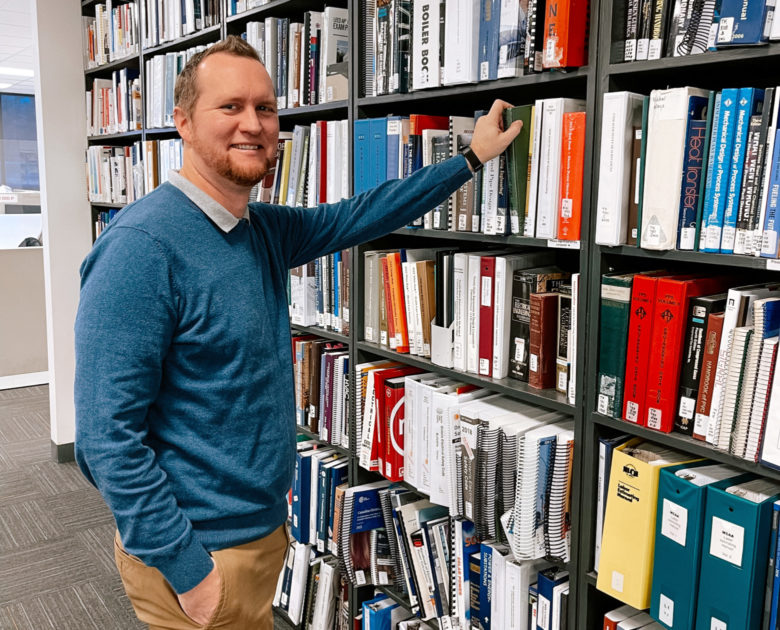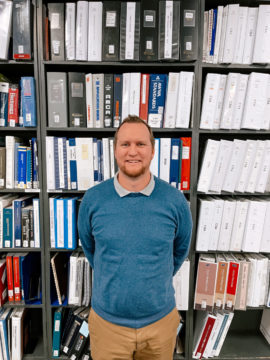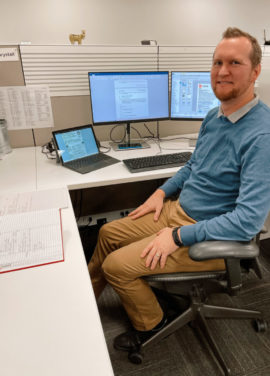Meet Heath Chrystall - Manager, Commercial

Heath, why did you want to become an engineer?
In a word, robotics! I was taking an automation and control engineering technology degree in New Zealand, which led to an engineering degree. After graduating, I worked in New Zealand for a couple of years at a multinational company where we did mostly tenant fitouts.
What would you tell people about what it’s like to work at HH Angus?
I like the atmosphere and the people. Colleagues are willing to support you, you can ask questions and everyone's open and friendly. You get to work on a variety of projects and size of projects as well, both across divisions, but also within divisions. For example, in healthcare you're not just working on big hospitals. There are also renovations and a great variety of smaller projects.
You've had an interesting career trajectory. Some engineers work in one area of specialization for their entire careers, but you are now in your third division at HH Angus – first Health, then Technology and now Commercial. What about that interests you?
Rather than having to change companies to move along in my career, I’ve had the opportunity to work in different sectors and to stay at HH Angus. When I was ready to move up in my career, there was an opening for a project manager in the Technology Division, so I applied for that internal posting, rather than having to search for advancement elsewhere. And I saw the cross-divisional postings as a good opportunity to build my skills. It was a bit scary to go to a new division, since I hadn’t really done that type of work before, but it was great to learn different skills and start applying those, and now they are applicable in my role in the Commercial Division as well. It was a natural progression.
You are now a manager. Can you describe a typical day?
There are a lot of staff-related tasks, such as touching base with the people working on your projects. I get updates and make sure that the team is working on what we need them to be working on. Of course, there are always a lot of meetings, because I'm not just managing people, I'm also managing projects. So, I'm going to meetings a lot and sometimes I'm doing design work, project-related calculations or specifications as well.
Are those manager tasks things that you had to learn on your own, or is there support to train you when you move into a manager role?
Leadership training is provided to new managers, as well as to people who might be up and coming managers, so that was really helpful, and there are ongoing sessions throughout the year on various aspects of being a manager.
Looking back at the projects that you've worked on, which ones are you most proud about having been involved with?
I worked on the Fort St. John Hospital and Peace Villa project when I was in the Health Division. We were the first team to use Revit and that was a great learning experience and great professional experience for me. That project helped me develop from Designer to Lead Designer. It was good to be involved in a project from ‘sticks in the ground’ to a fully functioning hospital. Then there was the Joseph Brant Hospital, where I moved into a PM role. I guess the theme here for me is projects that helped me develop my career.
I also enjoyed working with TD Bank while I was in the Technology Division; they were a great client. Most of the projects were data centres, but there were a couple that helped move me in the direction of commercial/tech crossover projects, and eventually a move to the Commercial Division.
What part of your work do you enjoy the most?
I like coming up with a concept and design, and the planning and project management part of figuring out timelines and what we need to do by when.
There is a certain aspect of client relationship management that you, as a manager, have to undertake - how do you learn how to do that? Because, as we all know, not everything goes according to plan on a project.
I think it’s mostly experience, from shadowing a manager or shadowing the project manager in my earlier days; also, you have to understand different people, compare different approaches.
What do you think is the best thing professionally that you've learned so far?
I learned very early on the importance of words, such as ‘shall’ and ‘provide’; Language is an important part of an engineer’s skillset. For example, ‘provide’ means to both supply an item as well as install it.


What are some of the current trends or technologies and developments in the AEC sector that you find interesting or that seem promising?
I try to present a zero or a low carbon option for mechanical designs. I think air source heat pump technology is really where it's at for me, where you could have a large heat pump system and the rooftop chiller is also doing the heating, and then you have distributed fan coils throughout the space. When you say ‘heat pump’, a lot of people think of the little unit in your house that vents outdoors, but these things are getting larger and larger and they're getting more efficient and better at heating and cooling.
What are useful skills that have helped you progress in your career and help you in client relationships?
Being able to read people is useful in building trust with a client. You need to know how to deal with different kinds of people, so you know when to be completely professional and when you can be a bit more casual so that the other person is comfortable with your approach.
If you could change something about how buildings are designed and constructed, what would that be?
I'm currently working on a project where we’re a subconsultant to the contractor. In those projects, you don't usually use your engineering skills as much as you’d like to because the contractor controls the overall design as well as the cost. But when it's design assist, you’re working with the contractor and have the opportunity to advocate for aspects of the design. There's more give and take and collaboration - the more collaborative it is, the more we’re working for the same end goal. That’s something I’d like to see happening more. I’d also like to see owners getting more involved so we can develop an even deeper understanding of the owner’s project requirements.
Is there anything that people would be surprised to learn about you?
Because of my Kiwi accent, it is natural to assume I was born in New Zealand, but in fact my father was a NZ trade ambassador and travelled the world with my family, so I was born abroad. When I was five, we settled in New Zealand.
